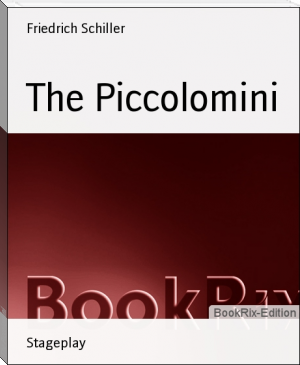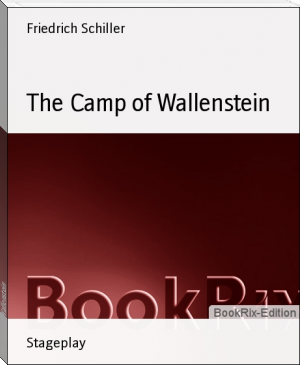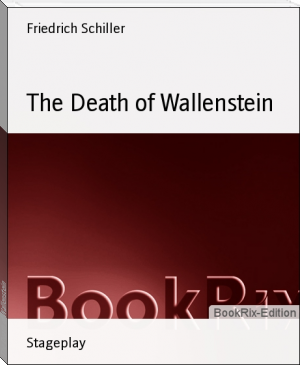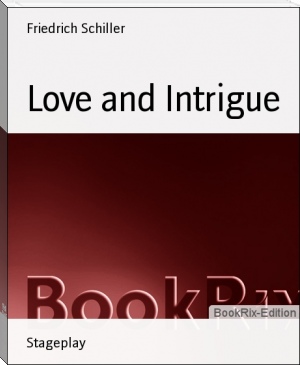The Piccolomini by Friedrich Schiller (summer reads TXT) 📖

- Author: Friedrich Schiller
Book online «The Piccolomini by Friedrich Schiller (summer reads TXT) 📖». Author Friedrich Schiller
Hah! here they come!
ILLO. The sentries are saluting them: this signal Announces the arrival of the duchess.
OCTAVIO (to QUESTENBERG). Then my son Max., too, has returned. 'Twas he Fetched and attended them from Caernthen hither.
ISOLANI (to ILLO). Shall we not go in company to greet them?
ILLO. Well, let us go--Ho! Colonel Butler, come.
[To OCTAVIO. You'll not forget that yet ere noon we meet The noble envoy at the general's palace.
[Exeunt all but QUESTENBERG and OCTAVIO.
SCENE III.
QUESTENBERG and OCTAVIO.
QUESTENBERG (with signs of aversion and astonishment). What have I not been forced to hear, Octavio! What sentiments! what fierce, uncurbed defiance! And were this spirit universal----
OCTAVIO.
Hm! You're now acquainted with three-fourths of the army.
QUESTENBERG. Where must we seek, then, for a second host To have the custody of this? That Illo Thinks worse, I fear me, than he speaks. And then This Butler, too--he cannot even conceal The passionate workings of his ill intentions.
OCTAVIO. Quickness of temper--irritated pride; 'Twas nothing more. I cannot give up Butler. I know a spell that will soon dispossess The evil spirit in him.
QUESTENBERG (walking up and down in evident disquiet).
Friend, friend! O! this is worse, far worse, than we had suffered Ourselves to dream of at Vienna. There We saw it only with a courtier's eyes, Eyes dazzled by the splendor of the throne. We had not seen the war-chief, the commander, The man all-powerful in his camp. Here, here, 'Tis quite another thing. Here is no emperor more--the duke is emperor. Alas, my friend! alas, my noble friend! This walk which you have ta'en me through the camp Strikes my hopes prostrate.
OCTAVIO.
Now you see yourself Of what a perilous kind the office is, Which you deliver to me from the court. The least suspicion of the general Costs me my freedom and my life, and would But hasten his most desperate enterprise.
QUESTENBERG. Where was our reason sleeping when we trusted This madman with the sword, and placed such power In such a hand? I tell you, he'll refuse, Flatly refuse to obey the imperial orders. Friend, he can do it, and what he can, he will. And then the impunity of his defiance-- Oh! what a proclamation of our weakness!
OCTAVIO. D'ye think, too, he has brought his wife and daughter Without a purpose hither? Here in camp! And at the very point of time in which We're arming for the war? That he has taken These, the last pledges of his loyalty, Away from out the emperor's dominions-- This is no doubtful token of the nearness Of some eruption.
QUESTENBERG.
How shall we hold footing Beneath this tempest, which collects itself And threats us from all quarters? The enemy Of the empire on our borders, now already The master of the Danube, and still farther, And farther still, extending every hour! In our interior the alarum-bells Of insurrection--peasantry in arms-- All orders discontented--and the army, Just in the moment of our expectation Of aidance from it--lo! this very army Seduced, run wild, lost to all discipline, Loosened, and rent asunder from the state And from their sovereign, the blind instrument Of the most daring of mankind, a weapon Of fearful power, which at his will he wields.
OCTAVIO. Nay, nay, friend! let us not despair too soon Men's words are even bolder than their deeds; And many a resolute, who now appears Made up to all extremes, will, on a sudden, Find in his breast a heart he wot not of, Let but a single honest man speak out The true name of his crime! Remember, too, We stand not yet so wholly unprotected. Counts Altringer and Gallas have maintained Their little army faithful to its duty, And daily it becomes more numerous. Nor can he take us by surprise; you know I hold him all encompassed by my listeners. What'er he does, is mine, even while 'tis doing-- No step so small, but instantly I hear it; Yea, his own mouth discloses it.
QUESTENBERG.
'Tis quite Incomprehensible, that he detects not The foe so near!
OCTAVIO.
Beware, you do not think, That I, by lying arts, and complaisant Hypocrisy, have sulked into his graces, Or with the substance of smooth professions Nourish his all-confiding friendship! No-- Compelled alike by prudence, and that duty Which we all owe our country and our sovereign, To hide my genuine feelings from him, yet Ne'er have I duped him with base counterfeits!
QUESTENBERG. It is the visible ordinance of heaven.
OCTAVIO. I know not what it is that so attracts And links him both to me and to my son. Comrades and friends we always were--long habit, Adventurous deeds performed in company, And all those many and various incidents Which stores a soldier's memory with affections, Had bound us long and early to each other-- Yet I can name the day, when all at once His heart rose on me, and his confidence Shot out into sudden growth. It was the morning Before the memorable fight at Luetzen. Urged by an ugly dream, I sought him out, To press him to accept another charger. At a distance from the tents, beneath a tree, I found him in a sleep. When I had waked him And had related all my bodings to him, Long time he stared upon me, like a man Astounded: thereon fell upon my neck, And manifested to me an emotion That far outstripped the worth of that small service. Since then his confidence has followed me With the same pace that mine has fled from him.
QUESTENBERG. You lead your son into the secret?
OCTAVIO.
No!
QUESTENBERG. What! and not warn him either, what bad hands His lot has placed him in?
OCTAVIO.
I must perforce Leave him in wardship to his innocence. His young and open soul--dissimulation Is foreign to its habits! Ignorance Alone can keep alive the cheerful air, The unembarrassed sense and light free spirit, That makes the duke secure.
QUESTENBERG (anxiously). My honored friend! most highly do I deem Of Colonel Piccolomini--yet--if-- Reflect a little----
OCTAVIO.
I must venture it. Hush! There he comes!
SCENE IV.
MAX. PICCOLOMINI, OCTAVIO PICCOLOMINI, QUESTENBERG.
MAX. Ha! there he is himself. Welcome, my father!
[He embraces his father. As he turns round, he observes
QUESTENBERG, and draws back with a cold and reserved air.
You are engaged, I see. I'll not disturb you.
OCTAVIO. How, Max.? Look closer at this visitor. Attention, Max., an old friend merits--reverence Belongs of right to the envoy of your sovereign.
MAX. (drily). Von Questenberg!--welcome--if you bring with you Aught good to our headquarters.
QUESTENBERG (seizing his hand).
Nay, draw not Your hand away, Count Piccolimini! Not on my own account alone I seized it, And nothing common will I say therewith.
[Taking the hands of both. Octavio--Max. Piccolomini! O savior names, and full of happy omen! Ne'er will her prosperous genius turn from Austria, While two such stars, with blessed influences Beaming protection, shine above her hosts.
MAX. Heh! Noble minister! You miss your part. You come not here to act a panegyric. You're sent, I know, to find fault and to scold us-- I must not be beforehand with my comrades.
OCTAVIO (to MAX.). He comes from court, where people are not quite So well contented with the duke as here.
MAX. What now have they contrived to find out in him? That he alone determines for himself What he himself alone doth understand! Well, therein he does right, and will persist in't Heaven never meant him for that passive thing That can be struck and hammered out to suit Another's taste and fancy. He'll not dance To every tune of every minister. It goes against his nature--he can't do it, He is possessed by a commanding spirit, And his, too, is the station of command. And well for us it is so! There exist Few fit to rule themselves, but few that use Their intellects intelligently. Then Well for the whole, if there be found a man Who makes himself what nature destined him, The pause, the central point, to thousand thousands Stands fixed and stately, like a firm-built column, Where all may press with joy and confidence-- Now such a man is Wallenstein; and if Another better suits the court--no other But such a one as he can serve the army.
QUESTENBERG. The army? Doubtless!
MAX.
What delight to observe How he incites and strengthens all around him, Infusing life and vigor. Every power Seems as it were redoubled by his presence He draws forth every latent energy, Showing to each his own peculiar talent, Yet leaving all to be what nature made them, And watching only that they be naught else In the right place and time; and he has skill To mould the power's of all to his own end.
QUESTENBERG. But who denies his knowledge of mankind, And skill to use it? Our complaint is this: That in the master he forgets the servant, As if he claimed by birth his present honors.
MAX. And does he not so? Is he not endowed With every gift and power to carry out The high intents of nature, and to win A ruler's station by a ruler's talent?
QUESTENBERG. So then it seems to rest with him alone What is the worth of all mankind beside!
MAX. Uncommon men require no common trust; Give him but scope and he will set the bounds.
QUESTENBERG. The proof is yet to come.
MAX.
Thus are ye ever. Ye shrink from every thing of depth, and think Yourselves are only safe while ye're in shallows.
OCTAVIO (to QUESTENBERG). 'Twere best to yield with a good grace, my friend; Of him there you'll make nothing.
MAX. (continuing).
In their fear They call a spirit up, and when he comes, Straight their flesh creeps and quivers, and they dread him More than the ills for which they called him up. The uncommon, the sublime, must seem and be Like things of every day. But in the field, Ay, there the Present Being makes itself felt. The personal must command, the actual eye Examine.
 In literature a drama genre deserves your attention. Dramas are usually called plays. Every person is made up of two parts: good and evil. Due to life circumstances, the human reveals one or another side of his nature. In drama we can see the full range of emotions : it can be love, jealousy, hatred, fear, etc. The best drama books are full of dialogue. This type of drama is one of the oldest forms of storytelling and has existed almost since the beginning of humanity. Drama genre - these are events that involve a lot of people. People most often suffer in this genre, because they are selfish. People always think to themselves first, they want have a benefit.
In literature a drama genre deserves your attention. Dramas are usually called plays. Every person is made up of two parts: good and evil. Due to life circumstances, the human reveals one or another side of his nature. In drama we can see the full range of emotions : it can be love, jealousy, hatred, fear, etc. The best drama books are full of dialogue. This type of drama is one of the oldest forms of storytelling and has existed almost since the beginning of humanity. Drama genre - these are events that involve a lot of people. People most often suffer in this genre, because they are selfish. People always think to themselves first, they want have a benefit.




Comments (0)